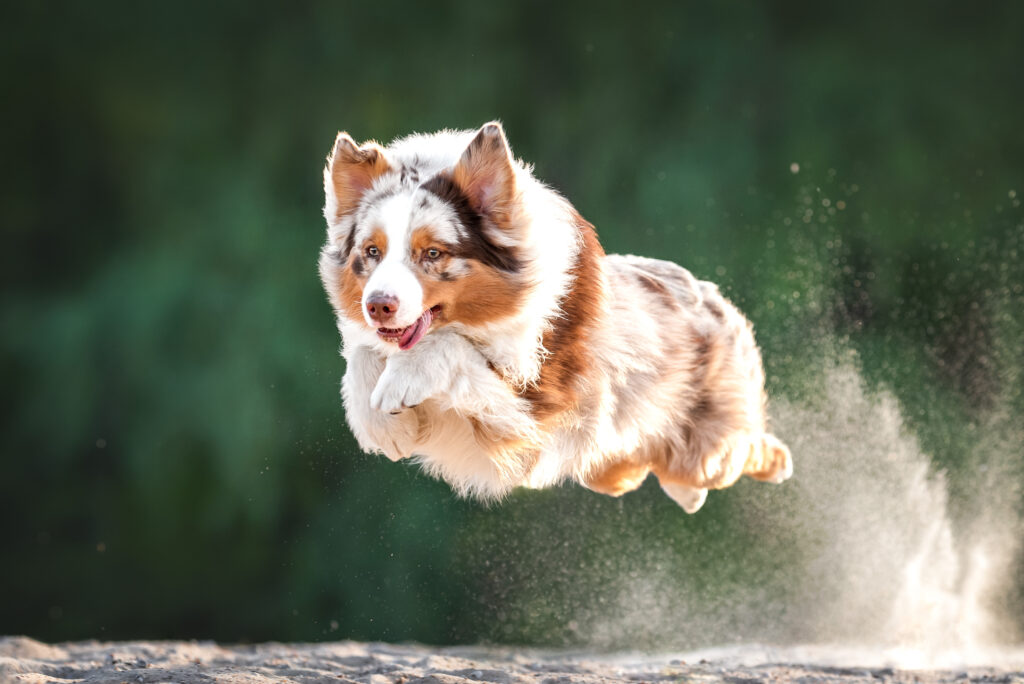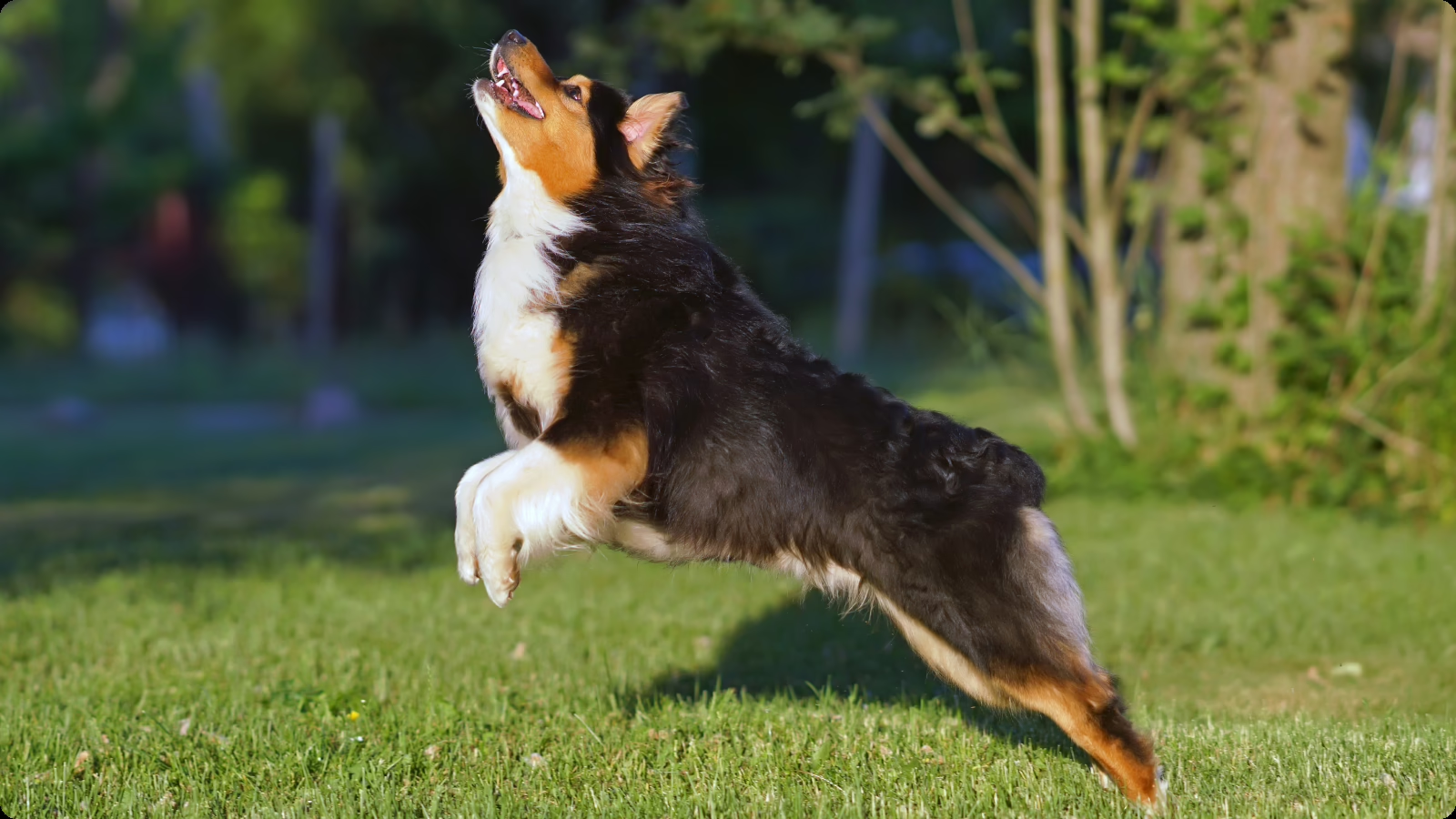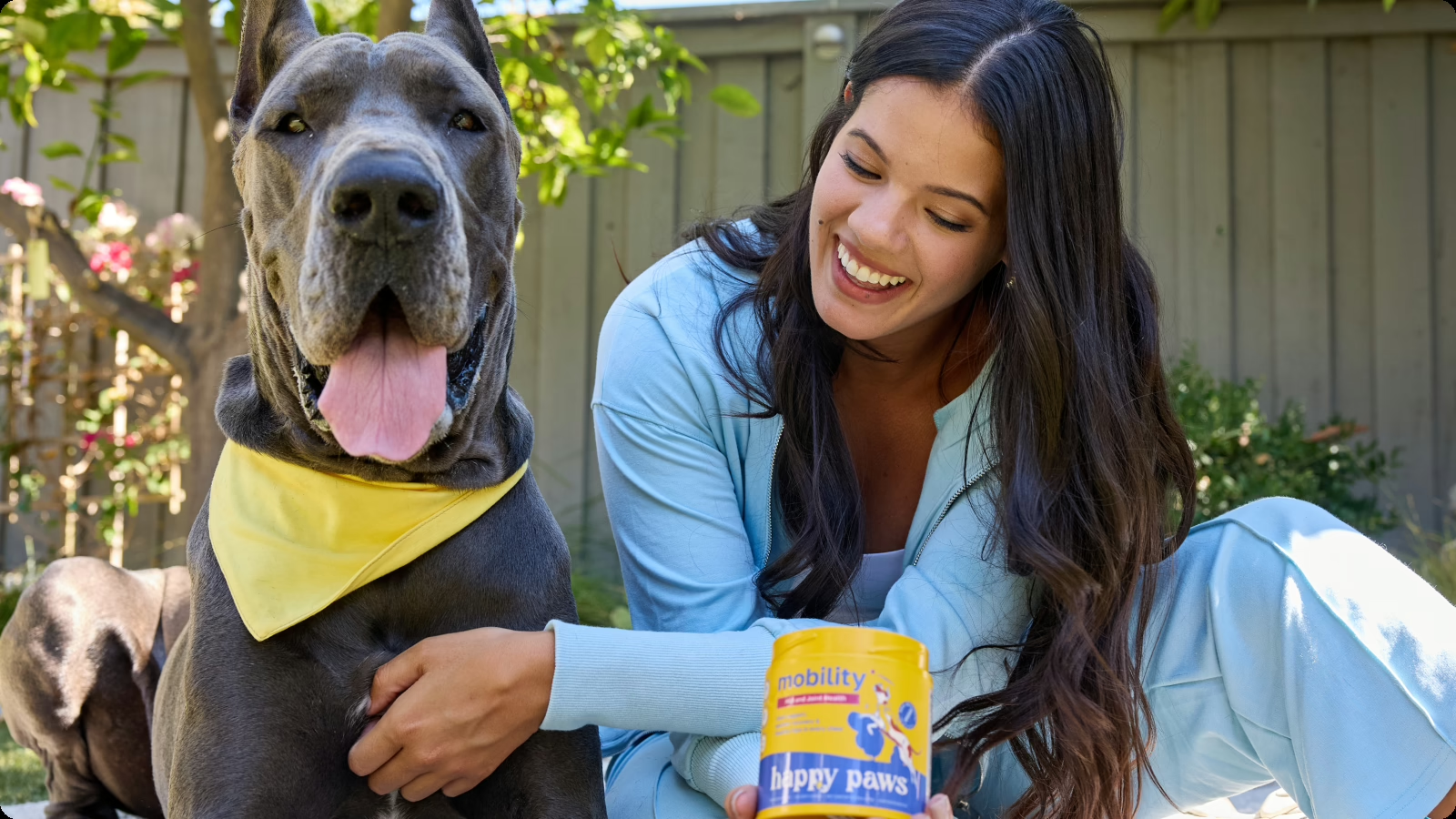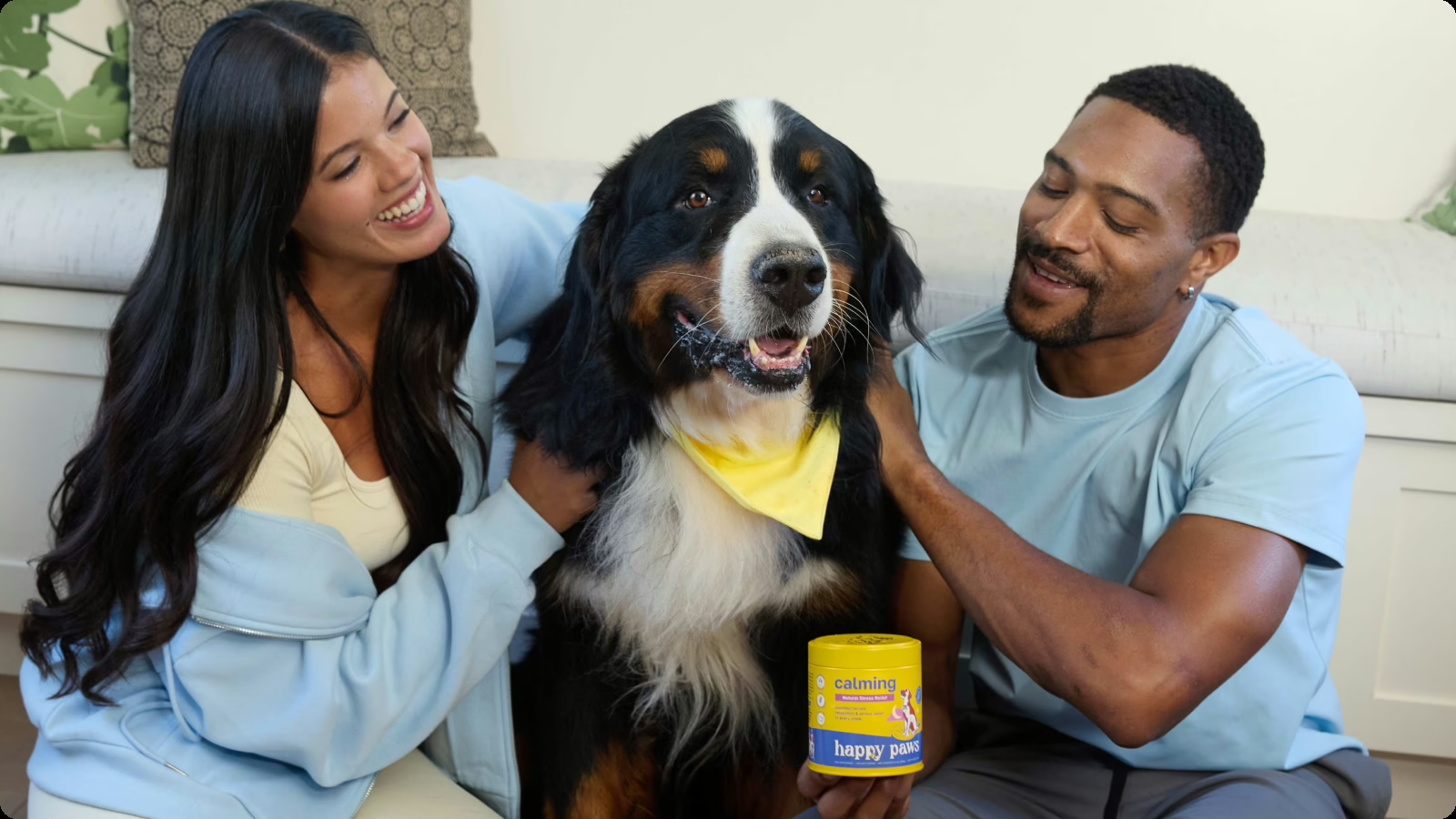The Sporty Sidekick
Deeply intelligent and immensely spirited, the Australian Shepherd (“Aussies,” for short) boasts both beauty and brains. First bred as working dogs in the American West, this confusingly named breed has inherited a battery that never fades. Their seemingly endless energy spills out day or night as they herd squirrels, other pets, or even your little ones. They are sporty, competitive, and always in charge—with that luscious mane flowing in the wind.
With their inquisitive personalities and piercing pale eyes, these dogs have garnered quite a cult following among dog lovers—and even mythical lore among Native American tribes. Plus, their pesky persistence has attracted owners who love the thrill of a new, exciting challenge—one that trains them as much as their lovely Aussies.
At Happy Paws, we’re dedicated to helping all dogs, from purebreds to certified mutts, live their happiest, healthiest lives. We’ve designed our dog supplements to target a range of trouble spots in your dog’s health, including common issues for an Australian Shepherd.
In this article, we’ll explore the history of this Australian-named American dog breed, provide some information and advice on how to care for them, and help you decide which supplements are best for your sporty sidekick, the Australian Shepherd.
Quick Facts
Origin: United States
Size: Medium
Breed Group: Herding
Lifespan: 12–15 years
Coat: Long—weekly grooming recommended
Temperament: Intelligent, energetic & friendly
Exercise Needs: Buried deep inside their bones, an Aussie is a natural herding dog—a premier herding dog. So, they are innately accustomed to running all day, every day, chasing down wayward livestock and shepherding animals five times their size. So, their daily exercise should include extensive cardio mixed in with some mental training. These dogs match well with active owners who take them on long nature strolls and hikes.
Training: All dogs need some degree of training, and the Australian Shepherd is no different. In fact, because of their endless battery, these dogs need more training than most. Aussies are intelligent and, at times, mischievous if their activity needs haven’t been met. So, it’s important to occupy their mind with daily obedience training. They need a task. Daily training gives them that structure to focus on and goals to work toward.
Dog Health: Like other small-to-medium-sized dogs, Aussies are prone to unique health challenges, such as joint issues, digestive woes, vitamin deficiencies, and more. We’ll discuss how to address each below.
Happy Paws for Australian Shepherds
Enrich your Australian Shepherd’s health with high-quality, tasty supplements like these!
| Type of Happy Paws Supplement | Best for … |
| Skin & Coat Dog Chews | Strengthening your dog’s coat & dermal health. |
| Dental Dog Chews | Fighting tooth decay & smelly breath. |
| 10-in-1 Multivitamin Dog Chews | Giving your pupper a daily dose of essential vitamins, minerals & other nutrients. |
| Bladder Health Dog Chews | Reinforcing your dog’s kidney & urinary tract system. |
| Hip & Joint Dog Chews | Soothing common symptoms of joint dysplasia & inflammation. |
| Probiotic Dog Chews | Restoring the healthy bacteria in your dog’s digestive system. |
In-Depth Look at These Popular Supplements
Our high-quality, tail-waggin’ dog supplements use an array of all-natural, organic ingredients to enrich your dog’s physical and mental health, while satisfying their taste buds. Here are a few dog supplements to help you care for your pup.
Skin & Coat Dog Chews: Our Skin & Coat Dog Chews help keep the glow in your Aussie’s sheen. These vegan, chicken-flavored soft chews use a blend of skin-supporting ingredients, like biotin and coconut oil, to restore dermal health and replenish your dog’s coat.
Bladder Health Dog Chews: Our Bladder Health Dog Chews use natural, renal-supporting ingredients to strengthen your pup’s kidneys and reinforce proper bladder health.
Dental Dog Chews: All dogs can experience bad breath (yes, even the pretty ones). Our Dental Dog Chews combine the refreshing aroma of spearmint with an enzyme blend to neutralize dental bacteria and curb stinky breath.
10-in-1 Multivitamin Dog Chews: Our 10-in-1 Multivitamin Dog Chews use multiple essential nutrients to strengthen your dog’s daily health and give them a well-rounded supplement. One vegan, lamb-flavored dog treat introduces ten critical nutrients to keep your dog healthy, happy, and active.
Hip & Joint Dog Chews: Soothe the symptoms of joint dysplasia with our Hip & Joint Dog Chews! Packed with a blend of joint-friendly ingredients, this dog supplement helps reduce inflammation and support joint health, thanks to compounds like glucosamine, chondroitin, and hyaluronic acid.
Probiotic Dog Chews: Made with powerful antioxidants, probiotics, and superfoods, our Probiotic Dog Chews help strengthen your dog’s digestive system, while supporting their gut and bowel health.
Immunity Dog Chews: Allergies are common for most dogs, and our Immunity Dog Chews are here to help! These pumpkin-flavored soft chews use a range of adaptogenic mushrooms, antioxidants, vitamins, and minerals to enrich your dog’s immune system and build back stronger immunity.
Common Health Concerns for Australian Shepherds
Compared to other breeds, Australian Shepherds are susceptible to unique health conditions like these:
Epilepsy: Australian Shepherds can be prone to epilepsy, a neurological disorder that may cause seizures. If your Aussie shows signs like convulsions or disorientation, consult your vet immediately.
Elbow & Hip Dysplasia: According to the American Kennel Club (AKC), many medium-sized to extra-large dog breeds are susceptible to elbow and hip dysplasia. This issue arises from birth when the bone in a joint is misshapen, causing an awkward fit in your dog’s joints. This defect can often lead to joint pain, osteoarthritis, limping, and trouble standing up.
Vitamin Deficiencies: Vitamin deficiencies can occur in dogs that exercise heavily, as they may need extra nutrients to support their active lifestyle. Deficiencies in B vitamins, vitamin E, and vitamin D can affect energy levels and overall health.
Allergies: Like many other breeds, Aussies can have an overactive immune system, leading to a number of common allergies. Plus, with their longer coat, these allergies can snowball into several types of dermal dilemmas. Signs that your dog has allergies include frequent skin infections, fur loss, constant licking, itching, scratching, or red, inflamed skin.
About the Australian Shepherd

You’d be forgiven if you thought the Australian Shepherd was born and bred in Australia. This long-haired, herding breed can actually trace its roots back to the Basque region: the small little nook where Spain and France meet at the Bay of Biscay. It was here that breeders and talented herdsmen worked together to fine-tune their special herding breed.
In the 1800s, these herdsmen emigrated to Australia, taking their dogs with them. Here, they paired their dogs with Border Collies, giving their dogs a smaller, more agile frame and a thick, flowy coat. Eventually, these herders emigrated across the Pacific and landed in the American West, where their dogs found their niche in sweeping California hills and treacherous Colorado Rockies. It was here the breed really took off, helping cowboys keep their herds intact and wrangle in livestock at rodeos.
Today, Australian Shepherds can still be seen on cattle drives, shepherding sheep, and even working quietly as service dogs. These dogs have an unrelenting loyalty to their owners and an unyielding drive that helps them earn a fur-ever place in your family.
The “Aussie” Temperament
Some Aussie owners equate their dogs to angels, while others say they’re more like toddlers in a fur suit with an insatiable appetite for play. So, where’s the truth? Probably somewhere in the middle. These dogs are loyal, energetic workhorses. When they find a task that they’re good at, and rewarded for, they’re going to go all out to flaunt their big, beautiful brains.
Because of this need for exercise, Aussies are best paired with an owner who is also a little sporty. These dogs do great on runs, hikes, or long walks. You might even be surprised how quickly they’re ready to go out and do it all again. If trained and socialized well, these dogs are playful around kids and other pets and can make a perfect furry little sidekick for most of your daily excursions.
How to Care for This Dog Breed
This breed has specific tendencies that require early training and routine maintenance to help your Aussie be successful at whatever they put their furry mind to. Here are a few extra tips to help keep your pet happy, healthy, and lively, from their puppy years and well into their golden years.
Consistent Grooming
Like other dogs with long hair, Aussies need special, routine grooming to keep their coat healthy. While these coats were handy for protecting them from brutal winters and sudden temperature changes, they might not be effective in all climates. So, be sure to manage your dog’s coat for the season and climate you’re in. This may involve routine haircuts, weekly baths, and monthly inspections for hot spots, hair loss, and other dermal dilemmas.
Early Socialization
Australian Shepherd puppies should be well-socialized and introduced to a variety of novel experiences. When your dog is young, introduce them to well-trained dogs, attentive strangers, and new environments. These different experiences will help your dog acclimate to change and learn how to better distinguish between friends and foes. Plus, early socialization will help build your dog’s trust and confidence in themselves, you, and the world around them.
Ample Exercise
As we’ve said before, we must iterate it again: these dogs are workhorses. They are overflowing with energy and gravitate toward physically demanding, mentally stimulating tasks. So, daily exercise and play are vital to maintaining order in your home. Exercise lets your dog run out their crazies, stretch out their body, and fill their mind with new scents and sensations.
Obedience Training
Though they come out of the litter looking dapper, the Australian Shepherd needs early obedience training to learn the rules of the road. This dog breed is very smart, so they’ll latch onto training fairly quickly.
Flex Their Herding Instincts
While you may not have acres of land and livestock galore, you can still help your Aussie tap into those instincts with daily games and challenges. Many Aussie owners train their dogs in a myriad of dog sports, from agility training to frisbee catching and more. Try to find creative ways to help your pup express this trait, and you’ll have a happy, healthy, exhausted dog.
Happy Paws: High-Quality Dog Supplements
Keeping your dog happy, healthy, and active shouldn’t feel like a full-time job. At Happy Paws, we’ve designed our dog treats with the best ingredients and flavors possible (our dogs definitely approve!). We’ve made sure these treats are certified organic, non-GMO, and third-party tested for purity, letting you spoil your dog easily with healthy, tasty dog treats.
FAQ
Is an Australian Shepherd a good house dog?
Yes, these dogs can be good house dogs, but they are best suited for experienced pet parents who have lots of land for their Aussies to roam. These dogs are innate herders. They have boundless energy. And they need to exercise their crazies daily. If they don’t, their wound-up energy may spill into unwanted behaviors.
Are Australian Shepherds high maintenance?
With their long coats and boundless energy, yes, Aussies can be considered high-maintenance. But it’s not easy lookin’ this pretty!
Do Australian Shepherds shed a lot of hair?
Yes, this dog breed sheds year-round. You’re likely to find little tufts of hair strewn out all around your home.
Do Australian Shepherds bark a lot?
Since they’re natural herders, Aussies tend to bark out orders or commands just ’cause.
How do you give an Aussie health supplements?
You can give your dog a Happy Paws health supplement in several ways. First, we’ve designed these supplements as dog treats, so you can give them to your pupper as a reward for good behavior. Or, you can add it to your dog’s kibble; they make a pretty tasty topper, too.





